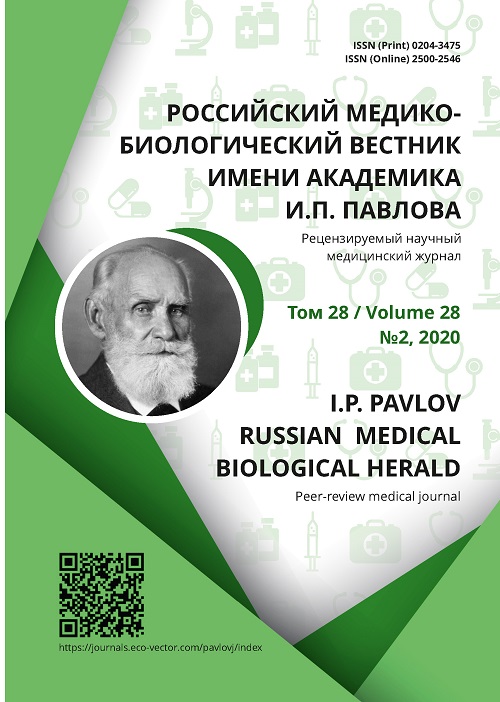基因多态性在结直肠癌发展中的重要性
- 作者: Kulikov E.P.1, Sudakov A.I.1, Nikiforov A.A.1, Mertsalov S.A.1, Grigorenko V.A.1
-
隶属关系:
- Ryazan State Medical University
- 期: 卷 28, 编号 2 (2020)
- 页面: 127-134
- 栏目: Original study
- ##submission.dateSubmitted##: 01.07.2020
- ##submission.datePublished##: 03.07.2020
- URL: https://journals.eco-vector.com/pavlovj/article/view/34899
- DOI: https://doi.org/10.23888/PAVLOVJ2020282127-134
- ID: 34899
如何引用文章
详细
目的:测定MTHFR (Ala222Val), XPD (Lis751Gln), XRCC1 (Arg194Trp), XRCC1 (Arg399Gln), XRCC1 (Arg208His), APE1 (Asp148Glu), hOGG1 (ser326Ces), P53 (Pro47Ser), VEGF (C654G), EGFR(A2073T), TNF(G308A), CHEK2 (Ile157Thr), MMP1 (1607 1G>2G), TIMP1(C53CT) 基因多态性在结直肠癌发生发展中的意思。
材料与方法。我们分析了106例在Regional Clinical Oncology Center 梁赞地区的国家预算机构接受治疗的结肠直肠癌患者。所有患者采用静脉血白细胞DNA提取、聚合酶链反应(PCR)进行基因分型,电泳检测结果。
结果:确诊时患者的年龄与任何被研究基因的多态性均无相关性(p> 0.05)。TNF基因多态性(G308A)与肿瘤分期有统计学意义:其主要纯合基因型G/G在III-IV期患者中更为常见(p=0.047)。G / G TNF等位基因(G308A)与MMP1基因纯合突变等位基因(1607 1G/2G)的存在,与III-IV期诊断患者比例的增加有直接关系。两种多态性的结合在研究组中具有统计学差异(p=0.025)。在10例IV期患者中,有8例发现VEGF基因(C654G)中存在G / G多态性。这种突变的纯合子变异在I期(37.5%)、II期(40%)和III期(37.5%)患者中更少见(p = 0.0147)。
结论。所研究的基因并不影响结肠直肠癌的年龄相关标准,而且在男女患者中发现的频率是一样的,无论年龄组。肿瘤的定位和分化程度也与所研究基因的多态性无关。TNF基因(G308A)的G / A多态性应被认为是有助于降低肿瘤侵袭性的有利标准(p <0.05)。G/G主要基因型的鉴定,特别是结合MMP1基因纯合突变等位基因(1607 1G/2G)是不利因素(p <0.05)。G/G VEGF纯合突变基因型(C654G)的存在与肿瘤快速进展和转移活性直接相关(p <0.05)。
全文:
结直肠癌是俄罗斯大常见癌症第三名。每年有超过60,000名患者被诊断出结肠直肠癌。在我国,共有35万多人登记为该病理。
此外,这类患者的治疗结果仍然不令人满意,很大程度上是因为在诊断验证时忽视了这一过程。结肠直肠癌(III-IV期)的发现较晚是由于缺乏筛查诊断程序,缺乏对这种病理的原因和危险因素的了解,以及疾病的直接病程,在某些情况下是非常快的。
现阶段在结直肠癌的治疗中,多采用手术、放疗、药物照射的联合或综合方法[1]。
癌症发生的特点,对治疗的反应可能很大程度上取决于患者的个体基因型,基因型编码了参与和预防癌变的各种机制[2, 3]。在这方面,大量的科学工作都是为了确定基因多态性与病理过程[4, 5]和各种肿瘤定位的关系[6, 7]。
本研究旨在确定MTHFR (Ala222Val)、XPD (Lis751Gln)、XRCC1 (Arg194Trp)、XRCC1 (Arg399Gln)、XRCC1 (Arg208His)、APE1 (Asp148Glu)、hOGG1 (ser326Ges, C326GES)、EGFR (A2073T)、TNF (G308A)、CHEK2 (Ile157Thr)、MMP1 (1607 1G> 2G)、TIMP1 (C53CT)基因多态性在结直肠癌发生发展中的价值。
按照目标,评估了多态性的关系与患者的性别、年龄在疾病的发病,与肿瘤的定位过程中,与肿瘤的分化程度、阶段的疾病的深度入侵和转移性肿瘤的蔓延。
材料与方法
这项研究是在Federal State Budgetary Educational Institution of Higher Education of Ryazan State Medical University of the Ministry of Health of Russia和Rostov Regional Clinical Oncology Dispensary国家预算机构的基础上进行的,并得到了当地伦理委员会的批准(15年11月6日第5号方案)。这项研究使用了人们签署知情同意书后的数据。
对存在多态性的基因MTHFR (Ala222Val)、XPD (Lis751Gln)、XRCC1 (Arg194Trp)、XRCC1 (Arg399Gln)、XRCC1 (Arg208His)、APE1 (Asp148Glu)、hOGG1 (P32) C654G)、EGFR (A2073T)、TNF (G308A)、CHEK2 (Ile157Thr)、MMP1 (1607 1G> 2G)、TIMP1 (C53CT)进行基因分型。
中央研究实验室的基因分型结果进行高等教育的联邦国家教育机构Ryazan State MedicalUniversity named after academician I.P. Pavlov俄罗斯联邦卫生部采用了从受试者静脉血白细胞中分离DNA,随后PCR电泳检测结果为《SNP-EXPRESS》(Litekh科研生产公司,俄罗斯)。
该研究包括106名已证实患有结直肠癌的患者。被检查患者的性别组成大致相等:58名男性(55%)和48名女性(45%)。根据发病时的总年数,按年龄将患者分为3组。第一组患者的早期表现为55岁(平均45.7岁—24人),第二组为55岁—65岁(60.1—48人),第三组为65岁以上(71.6岁—43人)。所有患者诊断时的平均年龄为61.5岁。
在所有患者中,76例患者(72%)被诊断为结肠癌,30例患者(28%)肿瘤定位于结肠其他部位。
100%的患者确诊。组织学上,所有肿瘤均以腺癌为代表,以中度分化为主(G-2,81%)。
疾病分期按照TNM国际分类第八版(2018年)进行。从发病情况来看,I-II期(无局部l / y转移病灶)患者比例为45.3%(48例),III期患者比例也为45.3%(48例)。10名患者(9.6%)在诊断时为IV期疾病。
使用Excel 2007软件包(MS,美国)、Statistica 10.0(Stat Soft Inc.,美国)和在线计算器哈代-温伯格定律(为Hardy–Weinberg平衡定律—https: // wpcalc.com/en/equilibrium-hardy -weinberg/)对结果进行统计处理。独立组中定性特征频率差异的描述和比较采用Pearson的χ2标准,用期望现象的数目从5到9,用耶茨校正或Fischer的精确标准值小于5。对该特征的预后意义进行评估,并确定在95%置信区间的相对风险。在患者组中,还评估了哈代-温伯格定律 (Hardy-Weinberg)的等位基因频率的偏差。在分析中,p <0.05为差异有统计学意义。
结果与讨论
男性和女性在性别上无显著差异(p> 0.05)。在寻找确诊时患者年龄与多态性之间的关系时,所研究的基因在入选组间均无统计学差异(p> 0.05)。此外,各年龄组均维持哈代-温伯格定律 (Hardy-Weinberg)平衡,表明等位基因频率在各年龄组分布的可靠性。
在根据肿瘤过程定位分析研究基因多态性时,差异无统计学意义(p> 0.05),在评估研究基因多态性对肿瘤分化程度的影响时,差异无统计学意义(p> 0.05)。
与诊断时的肿瘤进程的阶段的关系被评估。大多数多态性基因与生长期无直接关系(p>0.05)。统计上显著的关系被发现的多态性TNF G308A基因编码细胞因子肿瘤坏死因子:其纯合基因型主要G / G组更常见的新诊断阶段III-IV疾病患者(69%的患者)组患者相比,其诊断是在阶段I-II(40%的受试者,χ2 = 3.96,p = 0.047,OP = 1.45 (1.0;2.03),表1)。
表格1。TNF和MMP1基因多态性与疾病分期的关系
基因型/等位基因 | I-II 晚期 | III-IV晚期 | χ2,р | 相对风险 [95% 置信区间] |
TNF(G308A) | ||||
G/G | 18 | 33 | 3.96. р=0.047 | 1.45 [1.0; 2.03] |
G/A | 30 | 25 | ||
A/A | 0 | 0 | - | - |
GG | 66 | 91 | 2.57. p=0.11 | 0.77 [0.57;1.04] |
A | 30 | 25 | ||
TNF(G308A) + MMP1 (1607 2G/2G) | ||||
G/G | 3 | 16 | 5.04. p=0.025 | 1.85 [1.13; 3.05] |
G/A | 12 | 10 | ||
并分析了该基因的多态性与其它基因的关系。发现存在的G/G TNF等位基因(G308A),连同MMP1基因的纯合子突变等位基因(16071G/2G),有直接关系的增加患者的比例首次诊断阶段 III-IV。由这些基因编码的蛋白质在其生物学作用上是相似的,并且在增强彼此的活性方面是相互关联的。这两种多态性的组合在被检查组中具有显著的统计学差异(χ2 = 5.04,p = 0.025,相对风险= 1.85 [1.13;3.05),表1)。
尽管本研究纳入的IV期患者比例较小,但该组10例患者中有8例VEGF基因(C654G)存在G/G多态性。这种突变型纯合子变异在I期(37.5%)、II期(40%)和III期(37.5%)患者中更少见(p = 0.0147,相对风险= 5.42 [1.21;24.32),表2)。
表格2。肿瘤过程的分期和VEGF基因多态性
基因型/等位基因 | I-II 晚期 | III-IV晚期 | р | 相对风险 [95% 置信区间] |
|
VEGF (C654G) | |||||
C/C | 10 | 1 | р=0.0147 | 5.42 [1.21; 24.3] |
|
C/G | 49 | 1 |
| ||
G/G | 37 | 8 |
| ||
C | 69 | 3 | р=0.1 | 2.9 [0.88; 9.62] |
|
GG | 123 | 17 |
| ||
通过对基因多态性发生频率的分析,并没有发现结直肠癌发病时年龄的差异。可以想象,癌症在更年轻的年龄发展有遗传的理由,但这没有在这项研究中显示。
肿瘤的定位和分化程度也与所研究基因的多态性无关。
多态基因MTHFR (Ala222Val)、XPD (Lis751Gln)、XRCC1 (Arg194Trp)、XRCC1 (Arg399Gln)、XRCC1 (Arg208His)、APE1 (Asp148Glu)、P53 (Pro47Ser)、EGTr1 (A73)、TIM73 (TIM15) CH15 TIME、A73TR (TIM15) C53CT)对肿瘤更有侵袭性的生长和转移趋势无影响。
同时发现大纯合子TNF(G308A)G/G基因的携带与肿瘤高快速侵袭能力有直接关系,表现为疾病已处于III-IV期。至少一个TNF基因突变等位基因(G308A)的携带者可能对该细胞因子的功能减弱,其生物学效应也相应减弱。这些数据证实了已知的TNF-a细胞因子活性与肿瘤进展之间的关系,因为其能够增强细胞增殖,刺激新生血管生成,并增强其他炎症因子加速肿瘤生长[8]。由于肿瘤发生淋巴转移和远处转移需要较长的时间,因此鉴定一个特定基因的杂合状态(G/A)可能具有良好的预后价值。
我们还注意到,除了TNF基因型(G308A)G/G在患者体内存在突变型纯合等位基因MMP1 (1607 2G/2G),会导致肿瘤更有侵略性和更快的生长,所以这是一个不利的预后标准。这可能是由于TNF-a细胞因子过度诱导MMP1基因编码的基质金属蛋白酶,进而导致了的早期肿瘤转移[9]。
内皮血管生长因子VEGF的突变是肿瘤快速进展的一个显著的侵袭性危险因素。在我们的研究中,我们没有量化该基因在肿瘤细胞中的表达,但是,该等位基因(G/G)的突变基因型可能与血管生长增加和肿瘤快速进展有关。研究中包括的一小部分IV期肿瘤患者不允许我们明确地解释结果。但该基因突变在这一组中明显增加,需要进一步研究,并可能对这些患者的肿瘤组织进行额外的免疫组化检查。
结论
分析MTHFR (Ala222Val)、XPD (Lis751Gln)、XRCC1 (Arg194Trp)、XRCC1 (Arg399Gln)、XRCC1 (Arg208His)、APE1 (Asp148Glu)、hOGG1 (ser3253C47)、POG (P3232CES),EGFR (A2073T)、TNF (G308A)、CHEK2 (Ile157Thr)、MMP1 (1607 1G / 2G)、TIMP1 (C53CT)基因多态性在结直肠癌发生发展中的价值。
所研究的基因在两性中均有发现,且不影响大肠癌的年龄相关表现标准,以及肿瘤的定位和分化程度。
TNF基因多态性(G308A)与肿瘤快速侵袭深部组织的倾向之间存在可靠的关系,表现为III-IV期疾病的检测。G/A多态性的存在应被认为是有助于降低肿瘤侵袭性的有利标准(p <0.05)。G/G主基因型的存在,特别是与MMP1基因纯合突变等位基因(1607 1G/2G)结合,是III-IV期新诊断结直肠癌患者最常见的不利因素(p<0.05)。
G/G VEGF纯合突变基因型(C654G)的存在与肿瘤快速进展和转移活性直接相关。
加深对癌症本质的认识,了解某一患者未来的病程特点,将有助于提高患者的治疗效果,向个性化治疗过渡。
作者简介
Evgeniy Kulikov
Ryazan State Medical University
Email: moroka1695@yandex.ru
ORCID iD: 0000-0003-4926-6646
Researcher ID: S-1851-2016
MD, PhD, Professor, Head of the Department of Oncology
俄罗斯联邦, RyazanAleksey Sudakov
Ryazan State Medical University
Email: moroka1695@yandex.ru
ORCID iD: 0000-0002-6791-9797
SPIN 代码: 9307-0078
Assistant of the Department of Oncology
俄罗斯联邦, RyazanAleksandr Nikiforov
Ryazan State Medical University
Email: moroka1695@yandex.ru
ORCID iD: 0000-0002-7364-7687
SPIN 代码: 8366-5282
MD, PhD, Associate Professor of the Department of Pharmacology with the Course of Pharmacy of the Faculty of Additional Postgraduate Education
俄罗斯联邦, RyazanSergey Mertsalov
Ryazan State Medical University
Email: moroka1695@yandex.ru
ORCID iD: 0000-0002-8804-3034
MD, PhD, Assistant of the Department of Oncology
Vladimir Grigorenko
Ryazan State Medical University
编辑信件的主要联系方式.
Email: moroka1695@yandex.ru
ORCID iD: 0000-0002-4664-5723
SPIN 代码: 7174-5611
Researcher ID: F-8605-2019
Clinical Resident of the Department of Oncology
俄罗斯联邦, Ryazan参考
- Schmoll HJ, Van Cutsem E, Stein A, et al. ESMO Consensus Guidelines for management of patients with colon and rectal cancer. A personalized approach to clinical decision making. Annals of Oncology. 2012;23(10):2479-516. doi:10.1093/ annonc/mds236
- Savina NV, Nikitchenko NV, Kuzhir TD, et al. Polymorphism of Genes Coding DNA Helicases: Impact on the Life Span. Molecular and Applied Genetics. 2016;20:46-54. (In Russ).
- Turusov VS, Belitskiy GA, Pylev LN, et al. Khimicheskiy kantserogenez. Moscow; 2004. P. 204-50. (In Russ).
- Isaeva TN, Sevostyanova KS, Seryapina YV, et al. Associations of changes in haemostasis after endovenous laser treatment with genetic polymorphisms. Nauka Molodykh (Eruditio Juvenium). 2014;2(3): 72-82. (In Russ).
- Tarasenko SV, Bogomolov AY, Nikiforov AA, et al. Polymorphism of genes for alcochol dehydrogenase, cystic fibrosis, pancreatic secretory trypsin inhibitor, a cationic trypsinogen in patiens with chronic pancreatitis. I.P. Pavlov Russian Medical Biological Herald. 2016;(2):86-91. (In Russ).
- Kulikov EP, Mertsalov SA, Nikiforov AA, et al. Polymorphism of XPD gene in colorectal cancer. Nauka Molodykh (Eruditio Juvenium). 2019;7(3): 340-8. doi: 10.23888/HMJ201973340-348. (In Russ).
- Wen M, Zhou B, Lin X, et al. Associations Between XPD Lys751Gln Polymorphism and Leukemia: A Meta-Analysis. Frontiers in Genetics. 2018;9:218. doi: 10.3389/fgene.2018.00218
- Nowell PC. The clonal evolution of tumor cell populations. Science. 1976;194(4260):23-8. doi:10.1126/ science.959840
- Lee FY, Mankin HJ, Fondren G, et al. Chondrosarcoma of bone: an assessment of outcome. The Journal of Bone and Joint Surgery. American volume. 1999;81(3):326-38. doi: 10.2106/00004623-199903 000-00004
补充文件









